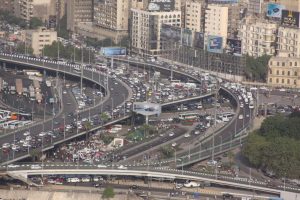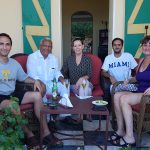 The air was unusually clear for Cairo, a city notorious for its polluted, hazy skies. Perhaps it was only because it was my first time seeing all the Christmas decorations set up for the bazaar that it felt like a crisp winter day.
The air was unusually clear for Cairo, a city notorious for its polluted, hazy skies. Perhaps it was only because it was my first time seeing all the Christmas decorations set up for the bazaar that it felt like a crisp winter day.
The bazaar was an opportunity for refugee women to showcase their skills and talents. Many of them were selling handicrafts, and others were dishing up food from their home countries. The smells mingled throughout the crowds.
There were clusters of tables and crowds of people– both Egyptians and expats. My presence seemed unnecessary. I couldn’t speak Arabic beyond the polite basics. If an Egyptian visited the table, the nicest thing I could say was “Good afternoon. Take.” as I handed them a leaflet about our programs (in Arabic of course). Sure, I could converse with fellow native English speaking expats, but my coworkers who were fluent in English were just as capable.
A few hours went by and more and more people passed. At one point, one of the Syrian women walked by. She stopped to look me in the eyes, paused, and began speaking in rapid Arabic. I had no idea what she was saying. “Sorry, what? I don’t understand.” I said slowly and awkwardly in Arabic.
She started talking again, somehow even faster and more loudly this time. I shrugged, hoping that she could read what I imagined was the “I have no idea what you’re saying to me” look in my eyes.
She sighed gently and rolled her eyes, but it was more affectionate than offensive. She let out a brief, sharp whistle, and a young girl appeared as if by magic next to her elbow. The woman spoke once more in rapid Arabic, and the girl turned to me and told me in excellent English that she wanted to invite me to eat at her stand. I was taken off guard. I had expected to go buy food from a stand at some point, but it seemed a little brazen of them to seek me out. But it’s hard to turn down a kind older woman and a bright-eyed young girl in matching hijabs.
“Yes, thank you,” I said as I got up and followed them. They led me to their stand, where a boy was keeping watch over the piles of food. The girl pointed at each dish and described them to me in English. There was bread, falafel, okra, and other typical Middle Eastern fare. She pointed at one dish of an orange colored mush in particular, her hand hovering a few seconds longer than with the other.
“This one is…” she faltered, looking at her feet sheepishly for a beat. Then, with a decisive nod of her head she continued her sentence and announced that it was “Halloween fruit” with the utmost confidence.
They handed me a plate. “Bikem?” I asked, which is the Arabic phrase for how much. I’d become very familiar with this phrase over those first couple of months. Everything had a price.
However, I was greeted by three horrified expressions. “No, no,” the girl told me, “this is a gift!”
I thanked them profusely in Arabic, surprised. I started putting food on my plate, taking smaller portions so as not to overly take advantage of their hospitality. After all, they were here to sell food.
“No,” the girl said, taking the serving spoon from me. She started piling more food on my plate.
The boy looked at me and shook his head. “All empty space on the plate must be covered. Otherwise it is offensive to us.”
I nodded solemnly in return.
By the time they were finished putting food on my plate I was almost worried the styrofoam would snap under all the weight. I had to support it with both hands, and couldn’t shake anyone’s hands as I thanked them many times.
Whenever I hear people discuss Syrian refugees, my mind goes back to that crisp day and that friendly family. I’m still amazed at their hospitality. Despite being forced to leave their home country and being strangers in a foreign land, they reached out to me, a considerably well-off foreigner. I don’t think I’ll ever forget that interaction or their kindness.
Whenever I hear talk about refugees, I think of that girl, her bright eyes and her quick-and-ready confidence. When people talk about their lack of food and other resources, I think back to the boy daring me to leave a patch of plate visible. When they discuss how the refugees have had to leave their homes behind, I think of the hospitality extended to me by foreigners in a land not their own. Their plight is a terrible one, but I’m beyond impressed by their resourcefulness, kindness, and hospitality. In the midst of the pain and suffering of the world, there is hope.
And for those who are no doubt wondering, the food was delicious. Especially the Halloween fruit.





Leave a Reply